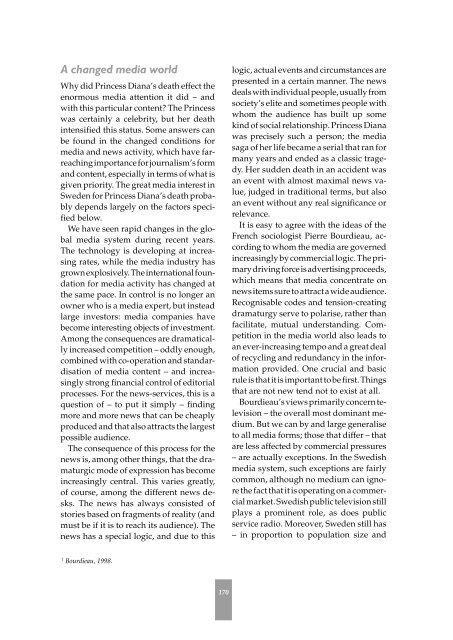slutet på sagan prinsessan dianas död i press, radio och tv
slutet på sagan prinsessan dianas död i press, radio och tv
slutet på sagan prinsessan dianas död i press, radio och tv
You also want an ePaper? Increase the reach of your titles
YUMPU automatically turns print PDFs into web optimized ePapers that Google loves.
A changed media world<br />
Why did Princess Diana’s death effect the<br />
enormous media attention it did – and<br />
with this particular content? The Princess<br />
was certainly a celebrity, but her death<br />
intensified this status. Some answers can<br />
be found in the changed conditions for<br />
media and news activity, which have farreaching<br />
importance for journalism’s form<br />
and content, especially in terms of what is<br />
given priority. The great media interest in<br />
Sweden for Princess Diana’s death probably<br />
depends largely on the factors specified<br />
below.<br />
We have seen rapid changes in the global<br />
media system during recent years.<br />
The technology is developing at increasing<br />
rates, while the media industry has<br />
grown explosively. The international foundation<br />
for media activity has changed at<br />
the same pace. In control is no longer an<br />
owner who is a media expert, but instead<br />
large investors: media companies have<br />
become interesting objects of investment.<br />
Among the consequences are dramatically<br />
increased competition – oddly enough,<br />
combined with co-operation and standardisation<br />
of media content – and increasingly<br />
strong financial control of editorial<br />
processes. For the news-services, this is a<br />
question of – to put it simply – finding<br />
more and more news that can be cheaply<br />
produced and that also attracts the largest<br />
possible audience.<br />
The consequence of this process for the<br />
news is, among other things, that the dramaturgic<br />
mode of ex<strong>press</strong>ion has become<br />
increasingly central. This varies greatly,<br />
of course, among the different news desks.<br />
The news has always consisted of<br />
stories based on fragments of reality (and<br />
must be if it is to reach its audience). The<br />
news has a special logic, and due to this<br />
1 Bourdieau, 1998.<br />
170<br />
logic, actual events and circumstances are<br />
presented in a certain manner. The news<br />
deals with individual people, usually from<br />
society’s elite and sometimes people with<br />
whom the audience has built up some<br />
kind of social relationship. Princess Diana<br />
was precisely such a person; the media<br />
saga of her life became a serial that ran for<br />
many years and ended as a classic tragedy.<br />
Her sudden death in an accident was<br />
an event with almost maximal news value,<br />
judged in traditional terms, but also<br />
an event without any real significance or<br />
relevance.<br />
It is easy to agree with the ideas of the<br />
French sociologist Pierre Bourdieau, according<br />
to whom the media are governed<br />
increasingly by commercial logic. The primary<br />
driving force is advertising proceeds,<br />
which means that media concentrate on<br />
news items sure to attract a wide audience.<br />
Recognisable codes and tension-creating<br />
dramaturgy serve to polarise, rather than<br />
facilitate, mutual understanding. Competition<br />
in the media world also leads to<br />
an ever-increasing tempo and a great deal<br />
of recycling and redundancy in the information<br />
provided. One crucial and basic<br />
rule is that it is important to be first. Things<br />
that are not new tend not to exist at all.<br />
Bourdieau’s views primarily concern television<br />
– the overall most dominant medium.<br />
But we can by and large generalise<br />
to all media forms; those that differ – that<br />
are less affected by commercial <strong>press</strong>ures<br />
– are actually exceptions. In the Swedish<br />
media system, such exceptions are fairly<br />
common, although no medium can ignore<br />
the fact that it is operating on a commercial<br />
market. Swedish public television still<br />
plays a prominent role, as does public<br />
service <strong>radio</strong>. Moreover, Sweden still has<br />
– in proportion to population size and

















